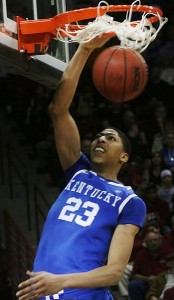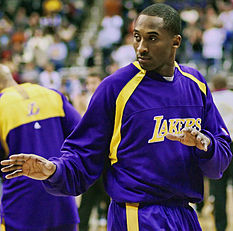 Anyone have a problem with all five of Kentucky’s starters declaring for the draft?
Anyone have a problem with all five of Kentucky’s starters declaring for the draft?
I don’t.
And if you do, you need to join all of us in the 21st century.
The decisions by UK freshmen Anthony Davis, Michael Kidd-Gilchrist and Marquis Teague and sophomores Terrence Jones and Doron Lamb to leave school early and enter the NBA may seem somewhat striking.
Among purists, fuddy-duddies and others trying to stand in front of the tidal wave of progress, there was some sense that the basketball sky was falling when five players put on identical warmups, sat in front of cameras and microphones and announced they would never wear those warmups again.
So what?
This has been going on for a while, folks. Kansas had three underclassmen leave last year. Kentucky saw five leave in 2010. Connecticut had three leave in 2006.
The dynamic of teenagers entering the NBA – much as they do for less lucrative jobs everywhere, every day – has been going on for a generation. And it’s not going to change unless the Players Association suddenly loses its mind and gives it away in collective bargaining.
The NBA is better for it, as entering teenagers have dominated the All-Star Game and seasonal awards over the last decade. So are the players who left school early, maximizing their earning power while learning the game from the world’s best coaches.
The naysayers throw out names like Leon Smith and Korleone Young, conveniently ignoring that they would not have been NBA players even if they had adopted the Blutarsky Plan. They point to the cautionary tale of the 2001 draft, forgetting that the much-maligned high school quartet of Kwame Brown, Tyson Chandler, Eddy Curry and Gana Diop are are still active more than 10 years later and have made a collective $260 million, with more to come.
And they overlook the sheer numbers, which illustrate in staggering fashion how players entering the NBA as teenagers have become the league’s elite over the last generation.
Let’s look at the All-Star Game, which annually represents the top 5 percent or so of an already highly elite profession.
In 1997, 86 percent of the All-Stars (25 of 29) spent three or four years in college. Among them were all-time greats such as Michael Jordan, Charles Barkley, Shaquille O’Neal, Scottie Pippen, Karl Malone, John Stockton, Patrick Ewing, Clyde Drexler and Gary Payton.
Five years later in 2002, the number had dropped to 50 percent (13 of 26), with names such as Tim Duncan, Steve Nash, Ray Allen, Paul Pierce and Vince Carter propping up some of the old guard.
By 2007, the number was down to 34 percent (10 of 29). Dwyane Wade, Josh Howard, Richard Hamilton, Carlos Boozer and Shawn Marion were among the newer names of upperclassmen.
This year? A paltry 20 percent of All-Stars (5 of 25) spent three or four years in college. They were Nash, Pierce, Wade, Deron Williams and Roy Hibbert.
Need more evidence? Fine. Let’s examine at the league’s annual individual awards over the last decade.
The Sixth Man Award makes the best case for staying in school, although it isn’t a very strong one. Five of the last 10 winners – Jason Terry, Bobby Jackson, Ben Gordon, Antawn Jamison and Corliss Williamson – spent at least three years in college.
The Defensive Player of the Year also has gone to upperclassmen five times in the last 10 years, but four-year small college marvel Ben Wallace has won four of them. (Marcus  Camby, a three-year collegian, is the other.)
Camby, a three-year collegian, is the other.)
The MVP has been won by four-year college players four times in the last decade – twice by Duncan and twice by Nash. The other six winners – Derrick Rose, Kobe Bryant, Dirk Nowitzki, Kevin Garnett and LeBron James (twice) – went to one combined year of college.
Most Improved Player has gone to two four-year players (Aaron Brooks, Danny Granger) and one three-year player (Bobby Simmons).
Finally, Rookie of the Year has been won by just one four-year player (Brandon Roy) and one three-year player (Emeka Okafor).
Although it is possible that backcourt mates Teague or Lamb could slip to the second round, all five UK players are projected (by folks who know a lot more about this stuff than me) as first-round picks who will receive guaranteed money.
So should Teague, Lamb et al spend the next two or three years in college, receiving a monthly pittance while trying to maintain some semblance of eligibility in pursuit of a degree that won’t serve any immediate purpose? Or should they leave school and immediately begin making millions over the next three to four years while receiving high-quality on-the-job training from supervisors and co-workers that could help them make countless more millions over the next decade? And if that doesn’t work out, at the very least they would have enough money to return to school and complete their degrees.
It’s not a trick question.
Why do folks get so bent out of shape about teenagers playing in the NBA? Don’t teenagers turn pro in golf and tennis and auto racing? Doesn’t Major League Baseball draft teenagers? Doesn’t pro soccer sign teenagers?
And what of the “real” world? Don’t millions of teenagers graduate high school every year and enter the work force as plumbers, builders, administrative personnel, salespeople, delivery drivers, sanitation workers,soldiers and firefighters? Where is the outrage – feigned or otherwise – in that widespread avoidance of further education?
It also should be noted that as an NBA player, your average work day is 2-4 hours, shorter than most school days; you have a minimum of three months off every year; there is plenty of travel to cosmopolitan cities, some of them international; and there is both a written and tacit employee benefits program in place that is unrivaled by any other profession.
Anecdotally, I grew up alongside plenty of friends who considered school an afterthought. One of them, upon finishing high school, immediately applied for and received a job with UPS. Automatically placed on a one-year probationary period, he was fired six months into his tenure when – believed to have a small parcel stuffed in his pocket – he was found with a sizable bag of marijuana. One chance not to screw up, and he blew it.
Compare that to the multitude of chances given and leeway afforded to addicts such as Chris Andersen, knuckleheads such as Andray Blatche, troublemakers such as Zach Randolph, insubordinates such as DeMarcus Cousins, slackers such as Tyrus Thomas, underperformers such as Darko Milicic and bad hires such as Gerald Green. Given their transgressions, in no other work force would they still be employed, let alone making millions.
Stop whining about how these ingrates don’t realize how good they have it as NBA players. They should have it that good. They are a work force of 450 on a planet of 7 billion people. As a group, they are far more elite than doctors, scientists, pilots or actors. They are entitled to every penny they can make.
And they shouldn’t waste one second of their earning power by remaining in school.
P.S. My friend who was fired by UPS? He went back to trade school and became an EMT.
Chris Bernucca is a regular contributor to SheridanHoops.com. His columns appear every Wednesday and Sunday. You can follow him on Twitter.
I’m going to disagree with you somewhat. First as long the rules permit it, kids might as well come out early. I don’t blame them, with the amount of money dangling in front of them. Certainly the colleges are exploiting them. If the NBA is going to put some type of age restriction on who can enter the draft, the college game needs to be fixed also. Second I find your stats a bit misleading. As more and more kids come out early sure that is going to skew the results to less players having gone to college a full four years. It’s only inevitable. Sure some kids are ready to come out early. Lebron certainly didn’t really need college, although would he be a better player in the clutch if he had some college seasoning under his belt? And what about Kobe? Sure a great player, but I remember him throwing up 4 air balls in a row in a playoff series while being swept by San Antonio. Would college experience help mitigate that? Dirk? Great player, but look how long it took to get that first championship. Would playing for college championships speed up the required mind set to compete at the NBA championship level? I don’t know. These 5 kids coming out of UK, are they really ready for the NBA. I don’t know. Maybe. They may hang around for 10 years or so with mediocre carters and rake in millions as Kawame Brown has, or they actually turn into superstars 2 or 3 or 4 years down the road. Time will tell. Personally I feel the game itself is what suffers the most from all the early exits out of college. Personally, I’m not really interested in seeing a team full of Kwame Browns muddle their way through the NBA.
I love this column, I wish you had written it two weeks ago though so I could have shared this with one of my students who was writing his research paper on the NBA draft age.
Also, to the previous person’s comment, I couldn’t agree more. Basketball “purists” should be more upset at how the NCAA and institutions of higher learning exploit basketball and football players. If a young adult can get millions guaranteed when they are 18-19 they have every right to do so.
The root of the problem is that the college system continues to perpetuate the sham of a “pristine” college athlete, all the while taking billions to the bank off these kids. The college system should be required to pay players a percentage of what the programs make. And no, the college scholarships are pittances compared to what the kids generate for the schools. Of course, this will also keep the kids in school longer – can you imagine what the Kentucky kids would make it they were paid fairly?
Of course, this will happen when pigs fly.